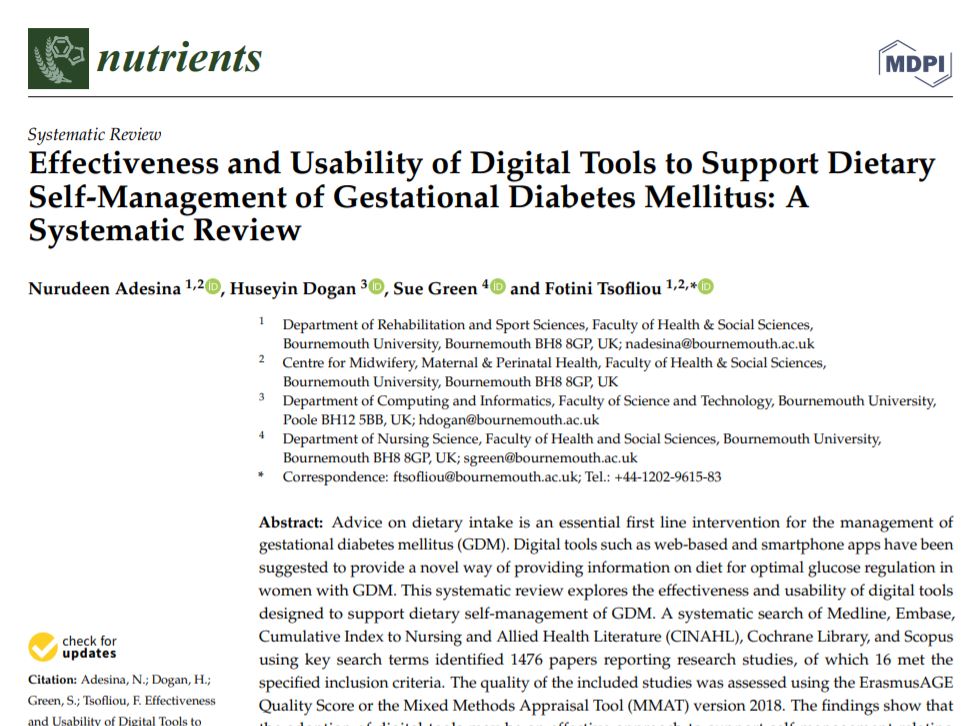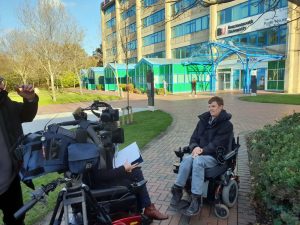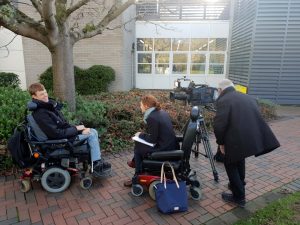Congratulations to BU PhD student Nurudeen Adesina on the publication of his systematic review. Nurudeen together with Huseyin Dogan in the Department of Computing & Informatics, Sue Green in the Nursing for Long-term Health Centre, and Fotini Tsofliou in Centre for Midwifery, Maternal & Perinatal Health (CMMPH) appeared in print just before Christmas with their paper ‘Effectiveness and Usability of Digital Tools to Support Dietary Self-Management of Gestational Diabetes Mellitus: A Systematic Review‘ [1].
 This new paper highlights that advice on dietary intake is an essential first line intervention for the management of gestational diabetes mellitus (GDM). Digital tools such as web-based and smartphone apps have been suggested to provide a novel way of providing information on diet for optimal glucose regulation in women with GDM. This systematic review explored the effectiveness and usability of digital tools designed to support dietary self-management of GDM. A systematic search of Medline, Embase,
This new paper highlights that advice on dietary intake is an essential first line intervention for the management of gestational diabetes mellitus (GDM). Digital tools such as web-based and smartphone apps have been suggested to provide a novel way of providing information on diet for optimal glucose regulation in women with GDM. This systematic review explored the effectiveness and usability of digital tools designed to support dietary self-management of GDM. A systematic search of Medline, Embase,
Cumulative Index to Nursing and Allied Health Literature (CINAHL), Cochrane Library, and Scopus using key search terms identified 1476 papers reporting research studies, of which 16 met the specified inclusion criteria. The quality of the included studies was assessed using the ErasmusAGE Quality Score or the Mixed Methods Appraisal Tool (MMAT) version 2018. The findings show that the adoption of digital tools may be an effective approach to support self-management relating to healthy diet, health behaviour, and adherence to therapy in women with GDM as a usable intervention. However, the four authors argue that there is a lack of evidence concerning the effectiveness of tools to support the dietary management of GDM. Consideration for ethnic specific dietary advice and evidence-based frameworks in the development of effective digital tools for dietary management of GDM should be considered as these aspects have been limited in the studies reviewed.
Reference:
Adesina, N.; Dogan, H.; Green, S.; Tsofliou, F. Effectiveness and Usability of Digital Tools to Support Dietary Self-Management of Gestational Diabetes Mellitus: A Systematic Review. Nutrients 2022, 14, 10. https://doi.org/10.3390/nu14010010
 Assistive Technology has been identified as one of the key strategic investment areas in the BU2025 vision. The filming focused on the use of different technologies for people with reduced physical and cognitive abilities and the use of alternative methods of interaction to control Dr Paul Whittington’s car.
Assistive Technology has been identified as one of the key strategic investment areas in the BU2025 vision. The filming focused on the use of different technologies for people with reduced physical and cognitive abilities and the use of alternative methods of interaction to control Dr Paul Whittington’s car.
 BBC filming the Faculty of Science & Technology was a great experience and we were very fortunate with the weather as there were clear blue skies and the cameraman commented that it was too sunny! It was an amazing opportunity to highlight and promote the Assistive Technology research being conducted at Bournemouth University.
BBC filming the Faculty of Science & Technology was a great experience and we were very fortunate with the weather as there were clear blue skies and the cameraman commented that it was too sunny! It was an amazing opportunity to highlight and promote the Assistive Technology research being conducted at Bournemouth University.










 Dr. Ashraf cited on ‘Modest Fashion’ in The Guardian
Dr. Ashraf cited on ‘Modest Fashion’ in The Guardian NIHR-funded research launches website
NIHR-funded research launches website Academics write for newspaper in Nepal
Academics write for newspaper in Nepal New paper published on disability in women & girls
New paper published on disability in women & girls Global Consortium for Public Health Research 2025
Global Consortium for Public Health Research 2025 MSCA Postdoctoral Fellowships 2025 Call
MSCA Postdoctoral Fellowships 2025 Call ERC Advanced Grant 2025 Webinar
ERC Advanced Grant 2025 Webinar Horizon Europe Work Programme 2025 Published
Horizon Europe Work Programme 2025 Published Horizon Europe 2025 Work Programme pre-Published
Horizon Europe 2025 Work Programme pre-Published Update on UKRO services
Update on UKRO services European research project exploring use of ‘virtual twins’ to better manage metabolic associated fatty liver disease
European research project exploring use of ‘virtual twins’ to better manage metabolic associated fatty liver disease